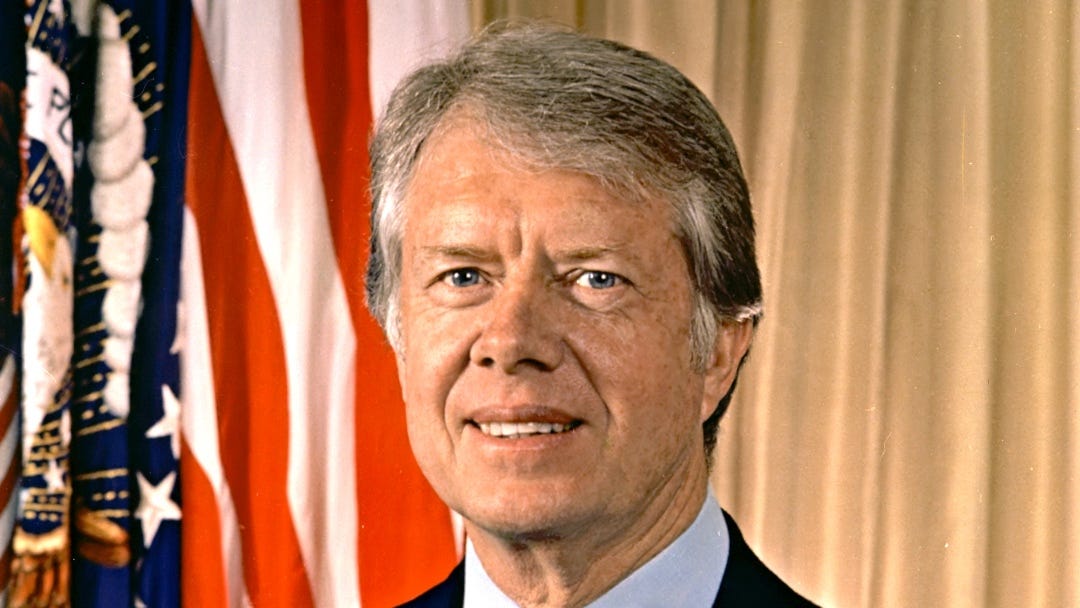European Childhood Memories of Growing Up With Jimmy Carter as "My First US President"
Remembering President Carter's compassion, integrity, and environmental legacy
Today, one hundred years ago, President Jimmy Carter was born. He is the first US president to live to be 100. True to his lifelong commitment to his country and aware of the challenges of any centenarian, his humble ambition is to cast a vote for Kamala Harris.
In the collective memory of many Americans, there's often a distinct recollection of their "first President" – not necessarily the one in office when they were born, but the one who made the earliest impression.
“My first President”
I grew up in Europe, where we closely followed anything that happened in America. Many non-American readers will likely recognize that they also have a clear memory of the first US President they can remember.
For me, that President is Jimmy Carter. I still remember my father telling me at breakfast how he narrowly defeated Gerald Ford in the 1976 election. I was eleven and fascinated by the country of cowboys, Hollywood, music, and, most of all, NASA's space programs.
I was vaguely aware of Gerald Ford, who had taken over after Richard Nixon's resignation. I knew about Watergate but imagined it as a failed break-in by the kind of masked burglars I saw daily in my comic books. Years later, while watching All the President's Men, I was slightly disappointed to learn that these burglars had been men in suits with ties.
Growing up in the Netherlands, where childhood freedom often meant exploring the village by bicycle, I was required to memorize my home address, a task made easier by the memorable street name, President Kennedy Lane. At the time, it was merely a string of letters and numbers. Strangely, the significance of that name only dawned on me many years later.
Interestingly, my memories of President Lyndon B. Johnson are entirely absent from my childhood memories. Looking back, I attribute this gap to my parents' deliberate efforts to shield me from the horrors of the Vietnam War. It was the US role in the liberation of our country that had given the Americans a status that didn't allow for much criticism by my parents and their generation. They wouldn't be alive without their - and other allied forces' - sacrifices, which led to a lifelong loyalty to our liberators.
So Jimmy Carter was "my first American President" between the ages of 11 and 15. In those years, I started to follow the news. Towards the end of his presidency, I assume my English had become sufficiently proficient to follow the BBC World Service news on my brown-colored oversized transistor radio with its long antenna and metallic cracking sound. From that time, I remember discussing the Iranian revolution with our history teacher at school and the embassy hostage drama that followed. By the time I watched the inauguration ceremony of Ronald Reagan, I was 15 and daily following the news.
Today, every newspaper will share stories about President Carter. I don't have much to add to the journalists' professionalism, and I look forward to reading those articles. In these notes, I wanted to share some personal memories about how it was for a boy growing up in Europe during Carter's presidency.
However, I do have two more comments to add:
Humanity
First, I join the many who admire Carter for his humanity, which he has demonstrated through decades of humanitarian work with Habitat for Humanity and the Carter Center. I can't think of any other US president who has shown such a commitment to social justice, peace, and alleviating human suffering.
His commitment to humanity is especially noteworthy since the media daily reminds us of a presidential candidate at the other end of the presidential humanity scale.
Seeing it from that perspective, Carter couldn't have a better birthday date for attracting worldwide attention. His message of humanity is timeless, but it is also timely, right before the Presidential election, with democracy on the ballot.
Tonight, on President Carter's hundred's birthday, the importance of humanity will again be in the limelight during the vice-presidential debate between Tim Walz and JD Vance. They will discuss topics where you should ask yourself which of these candidates cares about the plight of other people as Carter would have done. Judge for yourself, for instance, when the moderators ask them about women's rights. When in doubt, ask yourself which of these two candidates is more likely to live the kind of life of Jimmy Carter once they retire from politics: a life of modesty, service, and kindness to others.
Climate change
I have one more comment. In high school, when Jimmy Carter was President, I had little notion of global challenges. Environmental problems were local problems, while access to oil and gas had been a global policy since the beginning of the century. Only decades later, when I got involved with climate action, I started to appreciate Jimmy Carter's foresight during his presidency, particularly regarding environmental concerns and climate change.
Carter's presidency marks a pivotal moment in environmental policy. He signed 14 major pieces of environmental legislation and established a legacy that has shaped America's approach to conservation and climate action for decades. My memories are from nearly half a century ago, which makes it hard to remember what I knew at what age. But I have one memory of Carter's environmental commitment that I'm sure was of that period since I remember the friend with whom I discussed it and where we were sitting in a library in Utrecht. I just googled it and got the details of his solar panel initiative.
In 1979, President Carter installed 32 solar panels on the White House roof to promote renewable energy and reduce dependence on foreign oil during an energy crisis. However, his successor, Ronald Reagan, didn't reinstall them after roof repairs in 1986 because officials believed it would be "very unwise" to do so based on cost considerations and a general skepticism towards renewable energy initiatives.
Over the years, I occasionally learned more about Carter's environmental policy initiatives. Among these were the first federal funding for alternative energy, the creation of the Superfund for toxic waste cleanup, and the implementation of the first fuel economy standards. Most important is Carter's early recognition of climate change as a global threat. In 1977, he commissioned the Global 2000 Report to the President, an ambitious project exploring environmental challenges over the next two decades. This initiative led to three reports on global warming from the White House Council on Environmental Quality, with the final one devoted entirely to the long-term threat of carbon dioxide pollution.
Reading those insights from nearly half a century ago, I'm struck by the accuracy of climate predictions during Carter's tenure. The 1980 Council on Environmental Quality report urged "immediate action" and included remarkably precise calculations of future CO2 emissions.
Soon after Carter's presidency, his successors sidelined his vision for a cleaner, more sustainable world. I wish his successors would have followed up on his vision; how different would our world and global challenges look by now?
Removing those solar panels from the White House roof symbolizes the general policy direction changes that started during the Reagan Administration, whose impact is still evident everywhere in American socioeconomic and environmental policies. Worse, the effect of decades of pro-fossil fuel policies is hard to miss in the rise of atmospheric CO2 and climate change, and thus, today, it is in the news when following the reports about Helene or Asheville.
Visionary leader
I often write in this newsletter about the need for more visionary and brave leadership. Carter is a rare example; he laid the groundwork for modern environmental policy and climate action. Much like his humanitarian work, his commitment to these issues shows a leader deeply concerned with the long-term well-being of both people and the planet.
Tonight, you will watch the debate between the two vice presidential contenders, and soon, you will cast your vote for the presidential elections. One way to make your choice is to keep in mind what Carter would have done. Does one of the candidates seem stronger on compassion, integrity, or an environmental long-term vision? Maybe that's the one you would like to see in the White House; it may well be Jimmy Carter's choice as well.
September 29:
Reflections on the Road to Santiago and Climate Action
Last week, Andrea Weckerle from the Ready Living Podcast interviewed me. In the one-hour podcast, she asked me about a wide range of topics many of you will recognize as recurring themes in my newsletter.
September 28:
A Tale of Two Realities
I often feel a strange disconnect from reality. The world that I write about is in deep trouble, while I am experiencing a beautiful, crisp, sunny day in Oslo, Norway.
September 24
Uncovering the Secrets of Local History
Before starting today's story, I'll write a few words about the subtitle "Relics of History 1." As this phrase suggests, there will indeed be more newsletters with this subtitle.
Notes:
Photo: Department of Defense. Department of the Navy. Naval Photographic Center, Public domain, via Wikimedia Commons










My appreciation for your attention to President Jimmy Carter's legacy. It seemed the achievements of his administration were consistently downplayed over the years. Especially those related to the environment. I always suspected this was deliberate. Vote.
This is a lovely tribute.
President Carter was never given enough credit and appreciation for his contributions. The Washington elite disdained the Carters because they were humble, unpretentious people. They wouldn’t change. They stayed true to themselves. They Did Something. And they didn’t stop.
Let them inspire Americans to Do Something in November.